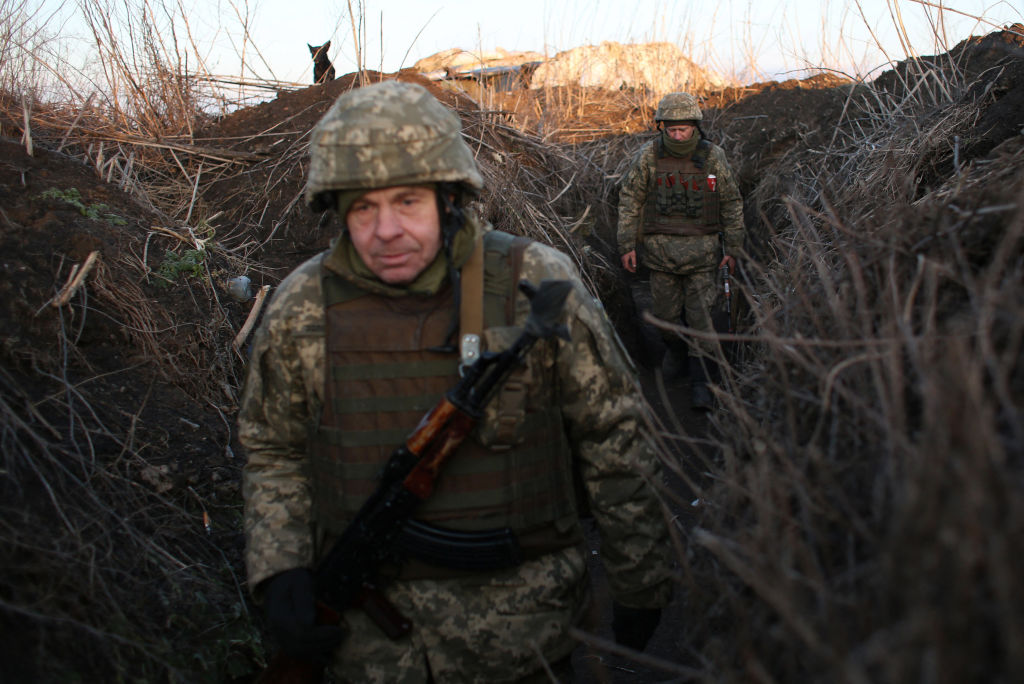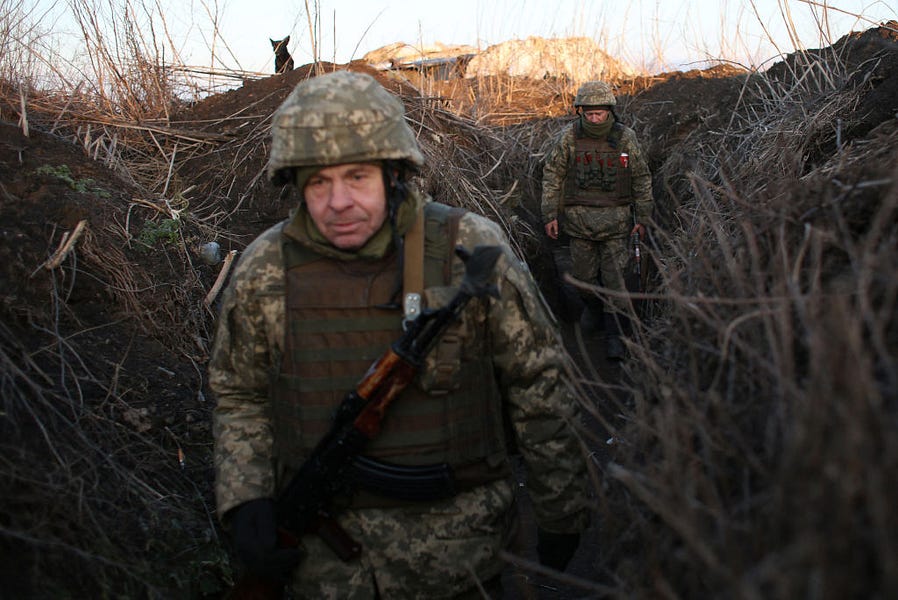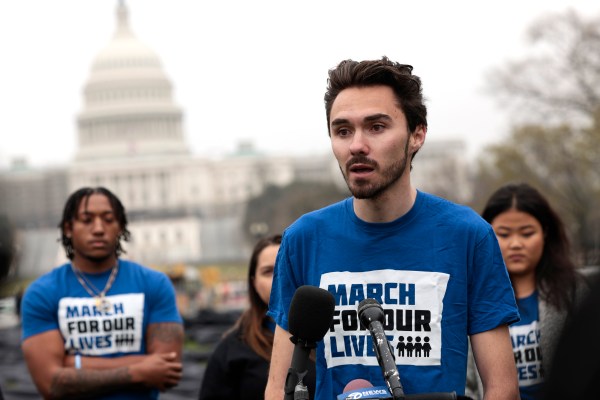Happy Monday! So long, 2022 Winter Olympics. We can’t wait to watch the 2026 Games in Milan, which—unless things in Italy take a seriously unexpected turn—won’t exist primarily as a public relations vehicle for a genocidal regime.
Quick Hits: Today’s Top Stories
-
White House Press Secretary Jen Psaki announced late Sunday night President Joe Biden had “accepted in principle” a meeting with Russian President Vladimir Putin on the condition that Russia “does not proceed” with military action in Ukraine. Any such summit would come after Secretary of State Antony Blinken meets—also conditionally—with his Russian counterpart, Sergey Lavrov, on Thursday. The administration isn’t optimistic the meeting will take place, as Biden told reporters Friday he is “convinced” Putin has made the decision to invade Ukraine and target the capital city of Kyiv.
-
Michael Carpenter, the U.S. ambassador to the Organization for Security and Co-operation in Europe, said Friday the U.S. believes Russia’s troop presence near Ukraine has increased over the past three weeks from 100,000 to between 169,000 and 190,000. The Kremlin said Saturday that the Russian military—under Putin’s direct supervision—had conducted successful hypersonic and cruise missile tests, and although Russia’s joint military exercises in Belarus had been scheduled to end yesterday, Belarusian Defense Minister Viktor Khrenin said they would be extended due to “the aggravation of the situation” in Ukraine.
-
Deputy National Security Adviser Anne Neuberger told reporters on Friday the Biden administration believes Russia to be behind the cyberattacks on Ukrainian banks last week.
-
The “Freedom Convoy” protest in Ottawa was mostly cleared over the weekend, with police stepping up enforcement in the wake of Prime Minister Justin Trudeau’s invocation of the country’s Emergency Act. Police announced Sunday afternoon they’d towed 79 vehicles and arrested 191 people on charges ranging from disobeying a court order to assaulting a police officer. Royal Canadian Mounted Police (RCMP) Deputy Commissioner Mike Duheme said yesterday the RCMP had frozen 206 personal and corporate bank accounts related to the protests.
-
Existing-home sales increased 6.7 percent from December to January as the median sales price rose 15.4 percent year-over-year, the National Association of Realtors (NAR) said Friday. Mortgage rates are climbing as the Federal Reserve signals impending interest rate hikes, with the 30-year fixed rate average nearing 4 percent for the first time since May 2019.
-
Special Counsel John Durham responded last Thursday to complaints from Michael Sussmann—a former Clinton campaign lawyer indicted for lying to the FBI—about his latest filing related to DNS data and Donald Trump. “If third parties or members of the media have overstated, understated, or otherwise misinterpreted facts contained in the Government’s Motion,” Durham writes, “that does not in any way undermine the valid reasons for the Government’s inclusion of this information.”
-
Former Minnesota police officer Kim Potter was sentenced on Friday to two years in prison after being charged with manslaughter in the death of motorist Daunte Wright. State sentencing guidelines called for a six to 8.5-year sentence; Potter claims she accidentally grabbed her handgun instead of her Taser when fatally shooting Wright.
-
Rep. Jim Hagedorn, a Republican from Minnesota first elected in 2018, died on Thursday at the age of 59 after a battle with kidney cancer.
Russia Steps Up Provocations in Ukraine

Discussing on Friday whether we would put together a full TMD for President’s Day, we came to the conclusion that we would—if developments in the Russia/Ukraine saga over the weekend warranted one. They did. Between yet another round of warnings from U.S. officials of an imminent Russian attack, renewed clashes between Kremlin-backed rebels and Ukrainian forces in the Donbas, hypersonic missile tests, Moscow’s continued deployments to the border regions, and tenuous diplomatic efforts, the past three days have been the most tense of the entire conflict.
President Biden set the tone in a bleak speech on Friday afternoon. “We have reason to believe the Russian forces are planning to and intend to attack Ukraine in the coming week—in the coming days,” he told reporters, later adding he is “convinced” Russian President Vladimir Putin has made his final decision. “We believe that they will target Ukraine’s capital, Kyiv, a city of 2.8 million innocent people.”
“We’re calling out Russia’s plans loudly and repeatedly,” Biden continued. “Not because we want a conflict, but because we’re doing everything in our power to remove any reason that Russia may give to justify invading Ukraine and prevent them from moving.”
Biden’s comments, NBC News reported yesterday, were supposedly based on new U.S. intelligence showing the Kremlin had handed down an order to Russian military officials to proceed with an invasion. If the Russians decide to target Kyiv, the United States believes tens of thousands of Ukrainian civilians and soldiers would die.
Once again, the forewarned, “imminent” large-scale Russian invasion failed to materialize. But the country’s troop buildup continued apace, with between 169,000 and 190,000 soldiers—nearly 75 percent of Russia’s conventional forces—now amassed along the Ukrainian border.
The days following Biden’s speech also saw an increase in attacks from Moscow’s local proxies. Ukraine’s Ministry of Defense reported at least 136 ceasefire violations by Russian-backed separatists on Saturday, up from 60 on Thursday and 66 on Friday. At least two Ukrainian soldiers were killed over the weekend and five others were wounded.
Meanwhile, the region’s so-called Donetsk and Luhansk “people’s republics”—known as DPR and LPR respectively—began the mobilization of men aged 18 to 55 in their occupied territory. Some reports indicate that boys as young as 16 have been called up to fight Ukrainian forces.
Russian propaganda continues to manufacture a rationale for such escalations, forcibly relocating civilians—supposedly hundreds of thousands of them—in a widely-publicized “evacuation” due to supposed Ukrainian aggression, and even “genocide.” A later metadata analysis first reported by Bellingcat found that the video statements by separatist leaders announcing the “emergency” measures were recorded days in advance, not necessarily in response to any specific action taken.
Ukraine’s Ministry of Defense, meanwhile, claimed the Russian separatist groups had shelled their own occupied territory and falsely attributed the attacks to the Ukrainian army. In remarks on Saturday, Ukrainian President Volodymyr Zelensky sought to dispel accusations that Ukraine planned to retake occupied territory by force. “Crimea and the occupied regions of Donbas will certainly return to Ukraine, but only peacefully,” he said from the Munich Security Conference. “We are as restrained as possible against the background of constant provocations … And what do we see? Shells and bullets from the other side. Our soldiers and civilians are being killed and wounded, and civilian infrastructure is being destroyed. The last days have become especially illustrative. Hundreds of massive shelling occasions with weapons prohibited by the Minsk agreements.”
During a busy three days in Munich, Vice President Kamala Harris tried to rally the U.S.’s allies around a collective response to continued Russian aggression, doubling down in particular on the economic deterrents at the international community’s disposal. “When we look at the significance of these sanctions, they are immense,” Harris said. “And so all nations who are a part of this understand that we cannot take lightly or speak lightly about what we are prepared to do, because we do understand the cost we are exacting, and it is severe.”
Despite the aggression of the pro-Russian forces—and cyberattacks on Ukraine the Biden administration attributed to the Kremlin—Secretary of State Antony Blinken is tentatively scheduled to meet with Russian Foreign Minister Sergey Lavrov later this week, barring a full-scale invasion. “My job as a diplomat is to leave absolutely no stone unturned to see if we can prevent a war,” he told CBS News yesterday. “And if there’s anything that I can do to do that, I’m going to do it.” Late Sunday night, the White House said Biden had “accepted in principle” a similar, conditions-based meeting with Putin to take place after Blinken and Lavrov’s summit. But will these summits actually take place?
Zelensky didn’t seem overly optimistic in Munich. “It is symbolic that I am talking about this right here. It was here 15 years ago that Russia announced its intention to challenge global security. What did the world say? Appeasement. Result? At least—the annexation of Crimea and aggression against my state,” he said. “We will defend our land with or without the support of partners. Whether they give us hundreds of modern weapons or five thousand helmets. We appreciate any help, but everyone should understand that these are not charitable contributions that Ukraine should ask for or remind of. These are not noble gestures for which Ukraine should bow low. This is your contribution to the security of Europe and the world.”
Deterrence by Disclosure
Last week, Charlotte wrote about the Biden administration’s efforts to broadcast U.S. intelligence on Russia’s potential next steps with respect to Ukraine. In a piece for the site today, former Defense and State Department official Eric Edelman expounds on this strategy—and its upsides and downsides.
Disclosure of Russian troop movements had some positive outcomes.
It alerted the American and European publics to the fact that a politico-military crisis was brewing. It signaled to Moscow that “we are watching you,” hopefully inducing some cautionary notes into internal Kremlin deliberations. Publicizing information about possible plots or provocations to provide a pretext or bogus casus belli had the impact of disrupting operational planning by the adversary (a lesson U.S. policymakers have learned over the past 20 years of disclosing plotting by violent Islamist extremists as part of U.S. counterterrorism policy). It also forced Vladimir Putin, Foreign Minister Sergei Lavrov, and other senior Russian officials to “deny” any intention of invading Ukraine.
Perhaps most important, deterrence by disclosure has bought time for the administration’s “relentless” and virtually non-stop diplomatic effort (for which it has gotten and generally deserves good grades). Moreover, there are some indications that U.S. disclosures have created some consternation in Moscow and, at the very least, produced the carefully stage-managed meetings of Putin with Foreign Minister Lavrov and Defense Minister Sergei Shoigu via which the Russians hoped to signal an intention to de-escalate and reinvigorate diplomatic efforts.
There are, however, very serious negative consequences to relying so heavily on deterrence by disclosure.
Making public information gleaned from sensitive intelligence inevitably runs the risk of giving away sources and methods. Although policymakers may judge that it is a worthwhile gamble to give away future intelligence in exchange for stopping a war now, it is impossible to calculate the potential costs for crisis management in the future. The constant warnings also run the risk of appearing to “cry wolf” too often. There already have been visible cracks in the alliance as both Ukrainians and some Europeans have offered less dire assessments.
To this point, the administration has handled this complication reasonably well, but if this turns out to be a longer crisis in which Putin pursues a “no war, no peace” strategy of managed tensions, there could well be a price to be paid in allied unity over time. The disclosures also sometimes seem to be playing into Russia’s hands in the information/political warfare space. The constantly ringing alarms allow Putin to play the “strongman” card to the hilt and remind the Russian populace, “Look how much the West fears me” (with the subtext “and so should you!”). It also cedes the initiative to him and allows him to set the tempo of the crisis by dialing the military pressures up or down (and seeking to accentuate the administration’s discomfort when it lowers the temperature by pointing out that the U.S. and its spokespeople are “hysterical.”).
Finally, by emphasizing that Putin has chosen war, disclosing the array of forces that have been positioned along the border and speculating about a multidirectional assault on Ukraine with a possible long-term occupation of significant parts of the country, the Biden administration has, perhaps, desensitized some proportion of the American and European public to any kind of land grab or “minor incursion” that is less than the full monty. If, as it turns out, Putin’s objectives in this crisis are more in line with what he has done in the past than the large-scale operation that many are now forecasting, it may be harder to mobilize opposition in the West than it otherwise would have been.
Worth Your Time
-
The Canadian trucker protest was a class war, Ross Douthat writes in his latest column, between what N.S. Lyons described as the “virtuals” who live in the digital world and the “practicals” who work in the “mundane physical reality” upon which the virtual society depends. “The truckers have leveraged the imposing presence of their trucks and the sympathy of other Practicals—from tow-truck drivers to cops—to attack the physical underpinnings of the capital’s economy,” he writes. “The counterstrike, while it’s finally evolved to actual physical removal, has been strikingly virtual: first a PR blitz to encourage friendly media to brand all the truckers as racists and anti-Semites and Trump supporters, then the convenient hacking and ‘doxxing’ of donors to the convoy, and then an invocation of the Emergencies Act which lets the government attack the protesters via the digital realm, freezing bank accounts and even cryptocurrency funds connected to the protests.”
-
In the New York Times, progressive writer Ezra Klein calls attention to what he believes could be President Biden’s biggest failure: the humanitarian crisis in Afghanistan. “The drought in Afghanistan is the worst in decades. The Taliban is a brutal regime that has no idea how to manage an economy, and in many ways is barely trying,” he writes. “But neither drought nor Taliban mismanagement fully explain the horror unfolding in Afghanistan. ‘The long and short of it is Western economic restrictions are creating an economic crisis in the country which is driving tens of millions Afghans into starvation,’ Graeme Smith, an Afghanistan expert at the International Crisis Group, told me.”
-
Drawing on history, Kevin Williamson argues in National Review that we must never forget why we cherish intellectual freedom. “Free speech and freedom of mind, if we understand them properly, should be rooted in intellectual humility,” he writes. “It is possible—it is certain—that some of the things we believe are wrong, be those matters of fact, matters of moral judgment, or estimates of the dangers posed by words and ideas that offend us. Be honest with yourself: If you had been present at the trials of Galileo, and everything you knew or had ever known pointed to his being in the wrong—the evidence of your eyes and all common human experience, the views of the most learned men and trusted of your community, every book on the subject you’d ever heard of, the proclamations of both church and state—do you think you would have made the right call? And that was, in a sense, an easy question—a question of fact that could be answered with mathematics and observation. If you think that you do not have it in you to hang a witch or to burn a heretic, you’re probably wrong about that, too.”
Presented Without Comment
Also Presented Without Comment
Also Also Presented Without Comment
Toeing the Company Line
-
Despite some early momentum, bipartisan talks on a Russian sanctions package stalled in the Senate last week. Haley catches readers up on the latest in Friday’s Uphill (🔒). Plus: Lawmakers’ efforts to prevent more space debris, and calls to temporarily eliminate the federal gas tax.
-
On Friday’s Dispatch Podcast, Sarah, Steve, David, and Declan discuss recent polling on Americans’ sense of satisfaction, the school board recall in San Francisco, the latest on Russia’s aggression in Ukraine, and whether Rep. Liz Cheney has helped or hurt the post-Trump cause.
-
Friday’s G-File begins with a brief tribute to the late “humorist” P.J. O’Rourke and ends with an intellectual defense of humor. “[P.J.] saw the absurdities in our politics and culture—large and small—and told the truth about them in terms we could relate to,” Jonah writes. “It was called humor. But it was a hell of a lot more.”
-
The crisis in Ukraine should awaken the patriotic American’s heart, David writes in Sunday’s French Press. “A criminal regime is on the verge of kicking down the door of a national home, and our nation should stand with the innocent, with those who wish to be left alone. We are all Ukrainians now.”
-
In the culture section this weekend, Alec Dent reviewed Death on the Nile, and Timothy Sandefur reflected on the poetry of Robert Hayden.
Let Us Know
Do you think the Biden administration should cut off diplomatic talks with Russia because of the Kremlin’s bad behavior so far? Or should Biden & Co. pursue diplomacy as long as they possibly can, even if it could validate and legitimize bad behavior?
Reporting by Declan Garvey (@declanpgarvey), Andrew Egger (@EggerDC), Charlotte Lawson (@lawsonreports), Audrey Fahlberg (@AudreyFahlberg), Ryan Brown (@RyanP_Brown), Harvest Prude (@HarvestPrude), and Steve Hayes (@stephenfhayes).







Please note that we at The Dispatch hold ourselves, our work, and our commenters to a higher standard than other places on the internet. We welcome comments that foster genuine debate or discussion—including comments critical of us or our work—but responses that include ad hominem attacks on fellow Dispatch members or are intended to stoke fear and anger may be moderated.
With your membership, you only have the ability to comment on The Morning Dispatch articles. Consider upgrading to join the conversation everywhere.